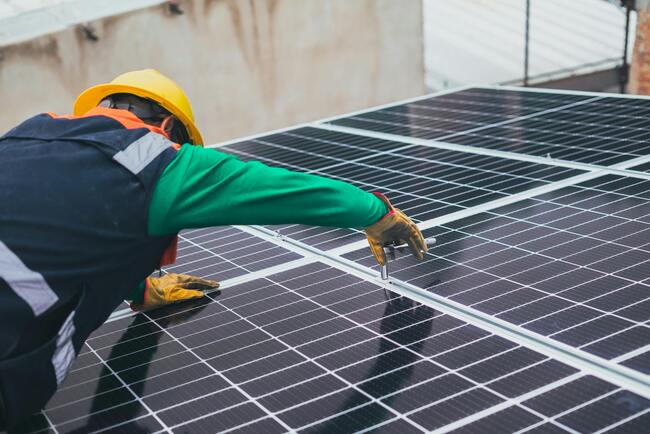- New myth-busting info shared on solar energy as 62% of Brits say the UK public is not well-informed about renewable energy solutions
- Two thirds of Brits would be more likely to use renewables if information on making the switch was more accessible
LONDON, UK. 6th November, 2024 – One third of Brits believe the UK climate is too cloudy for solar panels to work effectively, a new study* has shown, despite analysis proving this not to be the case. Two thirds agree the UK public is not well-informed about at-home renewable energy solutions and the same amount say they would be more likely to make the switch to renewables if more accessible information was available, according to research by energy transition experts Solar Together.
With this in mind, Solar Together has unveiled the top five solar myths most widely believed by the UK public and shared info to bust those myths to help those considering adopting renewable energy solutions. The top myths are as follows:
- Almost half of Brits believe it takes more than 15 years for the savings made by having solar panels to cover the initial investment. In reality, the actual payback period is between 6-10 years
- One third think the UK’s climate is too cloudy for solar panels to work effectively
- One third say solar panels are not effective in a typical British winter
- One third perceive the installation of solar panels to be a complex process
- One in five don’t think solar panels help to save money on energy bills – in reality, the average household with solar panels can save up to £500 on energy bills a year
With the clocks recently going back – and the days becoming colder and darker – more than one quarter of Brits say they become more conscious about saving energy at this time (26%), and one fifth say they think more about the environment (22%). Although the UK can see colder winters than some of our neighbouring countries, it’s worth noting that solar panels rely on the sun’s light, not its heat, to generate energy. Interestingly, they actually perform better in colder temperatures as excessive heat can reduce efficiency – the ideal temperature for peak efficiency is between 1C and 20C. Of course, solar panels receive less sunlight if there is a high density of clouds, but even on less clear and bright days, they still generate a substantial amount of energy and do not completely shut down. Installing a battery alongside solar panels can store and utilise any excess energy generated later.
With these facts widely unknown, there is a need for greater clarity and understanding about the effectiveness of renewable energy sources in the UK, particularly during the winter months. The study found that 62% of Brits agree the public is not well-informed about at-home renewable energy solutions, whilst revealing the perceived reasons for this lack of knowledge – which is holding back the UK’s push towards net-zero. Almost half believe government messages on renewable energy solutions are too complex (46%), suggesting existing messaging may need to change or be simplified to boost adoption across the UK. At the same time, nearly half say there is limited access to clear information about renewable energy solutions (44%), although two thirds would be more likely to consider renewable options if information was more accessible (67%).
In addition, 42% report that renewable energy solutions are not discussed within families and 35% say the fact children are not taught about these solutions in schools is behind the lack of awareness. A further 36% noted that renewable energy solutions are rarely shown or discussed on TV shows, and, interestingly, one quarter blamed celebrities for not talking about renewable energy solutions enough (24%).
George Frost, UK Country Manager at iChoosr, which delivers Solar Together’s solar panel group-buying initiatives, commented: “This study highlights the urgent need for better education and clearer communication about renewable energy in the UK. By making information more accessible and addressing common misconceptions, we can encourage more people to adopt renewable energy solutions and contribute to the UK’s net-zero goals.
It’s clear that a large proportion of the public finds existing messaging around renewables too complicated or confusing. This suggests we all need to work hard to demystify the perceived complexity while spreading the benefits of renewable energy to all corners of the UK.”
iChoosr has been collaborating with UK councils since 2015 on its Solar Together schemes, to accelerate the renewable energy transition nationwide. To date, Solar Together has delivered more than 42,500 installations, which are expected to remove over 680,000 tonnes of carbon emissions over the next 25 years.
About Solar Together:
The Solar Together scheme, delivered by iChoosr, is a group-buying initiative that enables households and businesses to purchase solar panels at a competitive price. By teaming up with local authorities, the scheme is able to leverage the collective buying power of residents to negotiate better rates from trusted solar panel providers. This not only helps to make solar energy more accessible and affordable but also supports the UK’s goal of achieving net-zero emissions by 2050. Solar Together is currently responsible for 10% of MCS-certified (Microgeneration Certification Scheme) solar panel installations in England – the independent certification scheme that certifies microgeneration (renewable energy) products and installers.
About iChoosr:
iChoosr was founded in 2008 and is privately owned by two co-founders. Before it entered the UK energy market in 2012, it had focused on collective schemes in the Netherlands and Belgium, where it works with community leaders to help households select energy and solar power suppliers. As in the UK, its operations continue to grow across Europe, North America and Japan.
Media Contact:
Lottie Wilson


























